 |
Convert MKA to MP3
|
Total Audio MP3 Converter converts MKA to MP3. The software is an ALL-IN-ONE
audio converter that supports more than 150 audio and video files, and supports
batch conversion.
- Free Download Total Audio MP3 Converter
- Install the Program by Step-by-step Instructions
- Launch Total Audio MP3 Converter by Clicking Start -> All Programs
-> Total Audio MP3 Converter -> Total Audio MP3 Converter
- Choose MKA Files
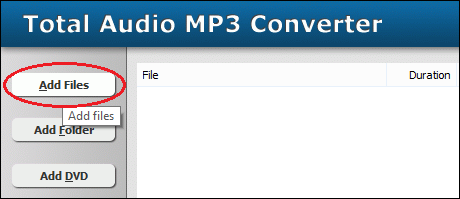
Click "Add Files" button to choose MKA files and add them
to conversion list.
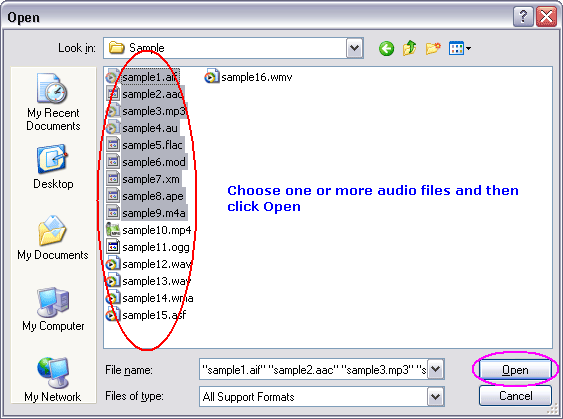
Choose one or more MKA files you want to convert and then click Open.
- Choose "to MP3"
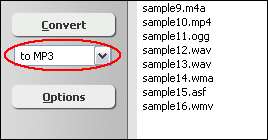
- Convert MKA to MP3
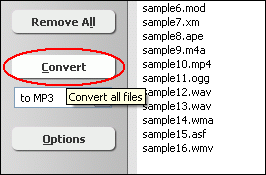
Click "Convert" to convert MKA files to MP3 format.
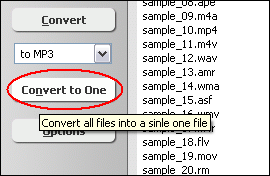
You can also click "Convert to One" to convert and combine/join/merge
all MKA files to one MP3.
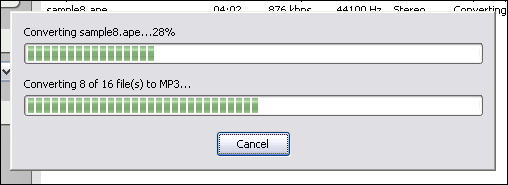
The software is converting MKA files to MP3 format.
- Play & Browse
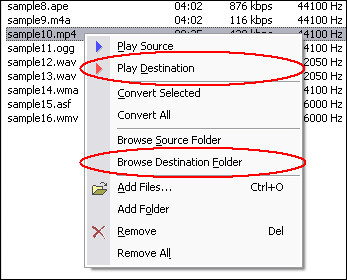
Right-click converted item and choose "Play Destination" to play
the destination file, choose "Browse Destination Folder" to open
Windows Explorer to browse the destination file.
- Done
Top
What is MKA?
The Matroska multimedia container formats were derived from a project called MCF,
but differ from it significantly because it is based on EBML (Extensible Binary
Meta Language), a binary derivative of XML. EBML enables future format extensibility,
without breaking file support in old parsers. This is a container, not a CODEC.
Get the parser from the Matroska site. MKA files are typical matroska files containing
only audio information, but no video. These files may typically comprise a complete
music album in one single file, where file chapters mark each song. In addition
to that the file can have attachement like lyrics or cover JPEGs, or even show
a Karaoke subtitle stream.
What is MP3?
MPEG-1 Audio Layer 3, more commonly referred to as MP3, is a digital audio encoding
format using a form of lossy data compression. It is a common audio format for
consumer audio storage, as well as a de facto standard encoding for the transfer
and playback of music on digital audio players. MP3's use of a lossy compression
algorithm is designed to greatly reduce the amount of data required to represent
the audio recording and still sound like a faithful reproduction of the original
uncompressed audio for most listeners, but is not considered high fidelity audio
by audiophiles. An MP3 file that is created using the mid-range bit rate setting
of 128 kbit/s will result in a file that is typically about 1/10th the size of
the CD file created from the original audio source. An MP3 file can also be constructed
at higher or lower bit rates, with higher or lower resulting quality. The compression
works by reducing accuracy of certain parts of sound that are deemed beyond the
auditory resolution ability of most people. This method is commonly referred to
as perceptual coding. It internally provides a representation of sound within
a short term time/frequency analysis window, by using psychoacoustic models to
discard or reduce precision of components less audible to human hearing, and recording
the remaining information in an efficient manner. This is relatively similar to
the principles used by JPEG, an image compression format.
MKA to MP3 Related Topics:
APE to MP3,
AU to MP3,
CDA to MP3,
CD to MP3,
MOD to MP3,
MP3 to AMR,
MP4 to MP3,
SND to MP3,
SPX to MP3,
TTA to MP3,
DTS to MP3,
DVD to MP3,
MKV to MP3,
MMF to MP3,
MOV to MP3,
DAT to MP3,
DIF to MP3,
DIVX to MP3,
H264 to MP3,
HDTV to MP3,
KAR to MP3,
MIDI to MP3,
MKA to MP3,
MP1 to MP3,
MPE to MP3,
MPGA to MP3,
OGM to MP3,
OGV to MP3,
QT to MP3,
RAM to MP3,
VCD to MP3,
MP3 Converter,
MPA to MP3,
Resample MP3,
VOC to MP3
|







